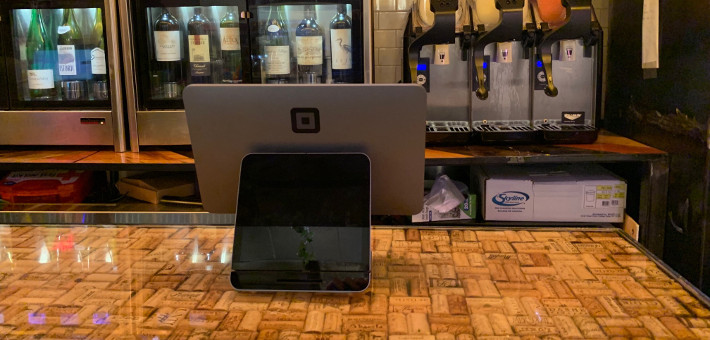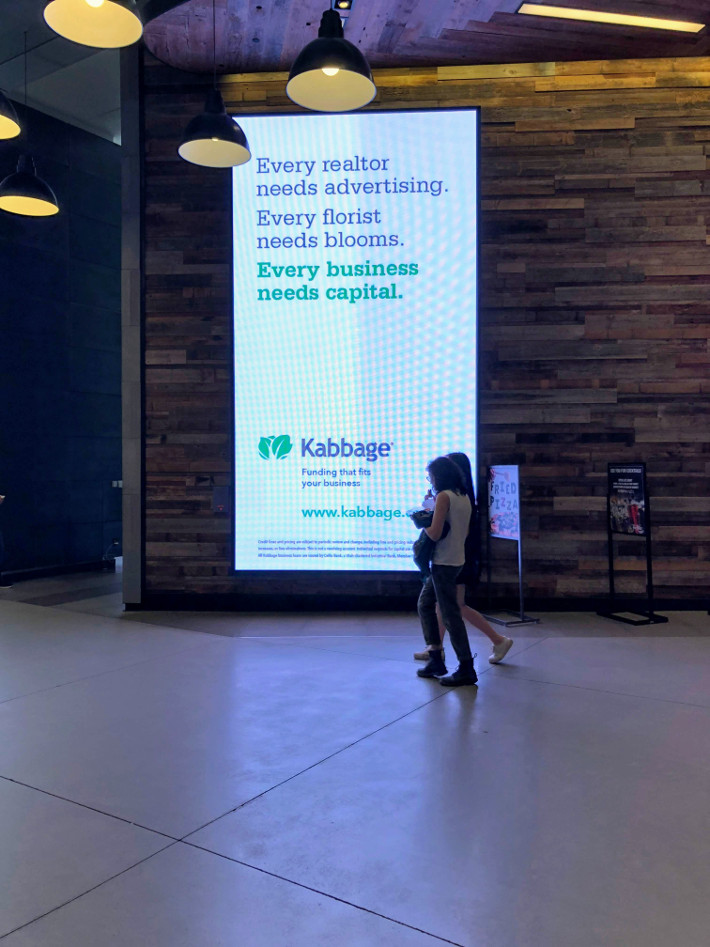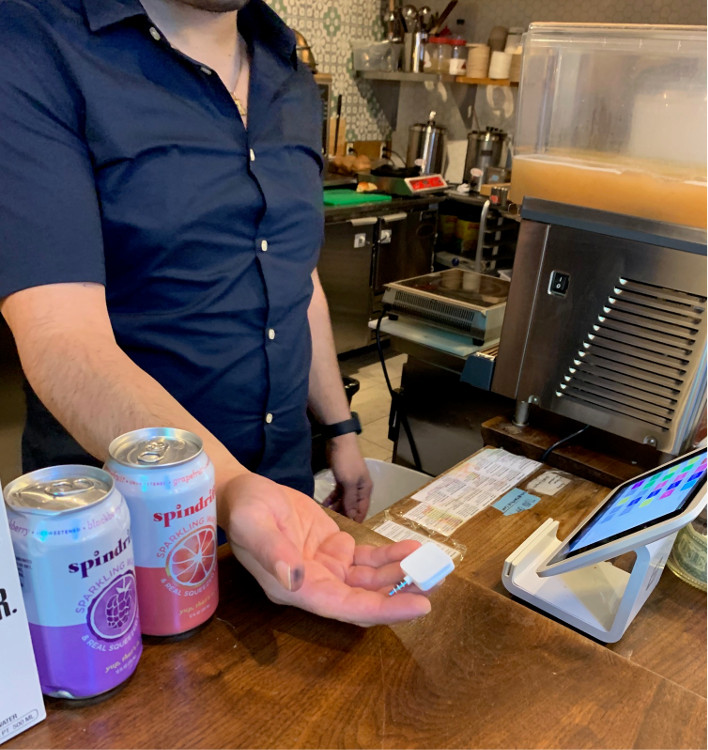Archive for 2019
Online Lenders Square Off, Offer The Kabbage In Brooklyn Food Court
April 10, 2019
In a fast gentrifying section of Downtown Brooklyn, online lenders are waging a silent turf war. Each day, hungry consumers flock to DeKalb Market, a subterranean hipster food court where lunch and a drink can cost $17. The maze-like space with retro neon signs and rustic wood countertops offers a dizzying array of cuisines, and with it, the opportunity to indulge in one’s own individual preferences. But if you’re looking for the vendor’s payment machines, you’ll notice an eerie sameness amidst a cacophony of color.

Square processed $85 billion in payments in 2018 and here in DeKalb Market, 75% of the vendors deBanked surveyed relied on Square’s Point-Of-Sale technology. The publicly traded company generated $2.5 billion in payment transaction fees last year alone, but it’s the add-on products like Instant Deposit, Cash Card, Caviar, and Square Capital that are propelling the growth. 244,000 businesses received a loan from Square in 2018 for a total of $1.6 billion. Borrowing is as simple as clicking a few buttons on the POS dashboard, making Square the presumptive lender of choice for businesses in the food court.
But the rankings on a national level say that Square trails behind Kabbage, an online lender with no reliance on a POS system. Kabbage’s growth trajectory has been epic, once a lending service for eBay merchants, the company is now one of the largest online small business lending companies in the United States.

Undeterred by the sea of Square dashboards, billboard advertisements for Kabbage once blanketed the periphery. The ads, which few consumers seemed to gaze at, were clearly meant for the business owners in between the food court and the mall above it. There was also a competitive feel to it, as if Kabbage was subconsciously communicating to Square that they were not alone.
Nowhere to be found was OnDeck, an online lender headquartered a short distance away in Manhattan that does more in loan volume each year than Square and Kabbage. But just because they can’t be seen doesn’t mean they’re not there. Blending into the crowd of consumers, deBanked spots business loan brokers, ones reputed to refer business to alternative capital sources and online lenders, OnDeck among them. 29% of OnDeck’s business in 2018 was attributed to Funding Advisors, an army of independent sales professionals across the country.
But they’re here for lunch just like everybody else, or are they? Their in-person presence may complicate their rivals’ efforts. Can a face and a handshake trump familiar software and the Internet? OnDeck’s $2.5 billion in 2018 loan volume suggests that their diverse sales strategy, including the use of Funding Advisors, has an impact.

Some vendors in DeKalb Market fail and go out of business. Others, like Cuzin’s Duzin, a homemade donut vendor made semi-famous by its feature on a Vice Media TV Show, The Hustle, recently completed renovations and further expanded its business into the nearby Barclay’s Center. Public records show the company just received financing from an equipment leasing company based in Washington State, a possible missed opportunity for the online lenders canvassing the space. Not for long, perhaps, as OnDeck announced it would be entering the equipment finance market this year.
As for Square, the love for the POS product presents a perceived edge. A general manager of Two Tablespoons, another food vendor, told deBanked that he thinks the Square system they rely upon is very easy to use. He said it also creates promotions that allow businesses like them to track customer spending and text a customer (with their permission) if they’ve earned, say, $5 off at a store.
But converting these vendors into borrowers is not guaranteed. Kabbage’s ads could not be found on a recent trip to the food court. And one shop selling burgers there told deBanked that they were aware of the loan product through Square because they use the POS for payments, but that they had no interest in using it to borrow money.
“It’s like a credit card,” she said. “What you take out, you owe. And we choose not to owe.”
Kabbage Could Be Neck and Neck with OnDeck for Originations This Year
April 8, 2019Kabbage funded $600 million in the first quarter of the year, putting it on pace to potentially overtake OnDeck in originations for 2019. OnDeck reported $658 million in originations just a quarter earlier to finish 2018.
The two companies have been among the top three funders by origination volume on deBanked’s leaderboard since 2014. OnDeck has consistently been on top with Kabbage and Square solidly in the #2 and #3 slots.
In 2018, OnDeck funded $2.48 billion, while Kabbage CEO Robert Frohwein told deBanked that the company originated “north of $2 billion.”
Both companies are expanding.
“We solidified our position as the leading online lender to small businesses in the US, launched ODX, our platform-as-a-service business, and announced plans to scale our international operations and enter the equipment finance market,” said OnDeck CEO Noah Breslow in a 2018 Q4 report statement.
Meanwhile, Kabbage announced in January of this year that it will be powering a program that offers financing to U.S. customers of the Chinese e-commerce giant Alibaba.
“Financing at the point of sale requires a fully automated solution that can handle the immense volume of daily transactions that occur on Alibaba.com,” said Kabbage CEO Rob Frohwein. “We are incredibly impressed with the service and value that Alibaba.com delivers to American businesses and want to do all we can to support their important mission.”
| Company Name | 2018 Originations | 2017 | 2016 | 2015 | 2014 |
| OnDeck | $2,484,000,000 | $2,114,663,000 | $2,400,000,000 | $1,900,000,000 | $1,200,000,000 |
| Kabbage | $2,000,000,000 | $1,500,000,000 | $1,220,000,000 | $900,000,000 | $350,000,000 |
| Square Capital | $1,600,000,000 | $1,177,000,000 | $798,000,000 | $400,000,000 | $100,000,000 |
deBanked’s leaderboard omits companies that have not disclosed their small business origination volumes.
Kabbage’s $700 million securitization that was announced today will be used to pay down a previous securitization.
Funding Circle SME Income Fund to Consider Winding Down
April 6, 2019The Funding Circle SME Income Fund (FCIF), a fund whose objective is to provide shareholders with a sustainable and attractive level of dividend income by lending, both directly and indirectly, to small businesses through Funding Circle’s platform, may soon be winding down. Earlier this week, the fund’s major shareholders expressed a desire to withdraw their capital and a vote will be scheduled to put this plan in motion.
The decision is not a surprise. The fund suffered a sharp decline in Net Asset Value late last year in part due to increasing business loan defaults.
Funding Circle Holdings (FCH), which trades on the London Stock Exchange, announced that a windup of FCIF would not affect the overall company’s 2019 guidance.
FCH CEO Samir Desai said of the news, “A global income fund providing access to a diversified portfolio of Funding Circle small business loans was the right strategy for investors and Funding Circle in 2015. However, there are now more appropriate and varied ways for investors to participate on the platform. We’re pleased to soon introduce two new investor products to the UK market. They will further expand the universe of investors that can access loans on our platform and continue to diversify our sources of funding, in line with the strategy we set out at IPO.”
Indicted Loan Brokers Out On Bond, 1 Still in Custody
April 5, 2019 Four of the five loan brokers indicted in a fake business loan scam that tricked an Ohio resident out of hundreds of thousands of dollars in upfront fees, have been released on bond. Only one, a defendant by the name of Haki Toplica, remains in custody. All of the defendants have entered pleas of not guilty.
Four of the five loan brokers indicted in a fake business loan scam that tricked an Ohio resident out of hundreds of thousands of dollars in upfront fees, have been released on bond. Only one, a defendant by the name of Haki Toplica, remains in custody. All of the defendants have entered pleas of not guilty.
In addition to the victim being asked for hundreds of thousands of dollars in upfront fees to apply for phony loans, he also signed over the title of 55 vehicles to the defendants to serve as the collateral. The vehicles included a Ford Mustang, several dump trucks, several tractors, several restored classic vehicles, a Freightliner motor home, and trailers.
Toplica was arrested in December and his co-conspirators in March. All of them are New York residents. The condition of one defendant’s release was that she remain working with her present employer. deBanked determined that her most recent employment was ironically that of a business loan broker.
Marketplace Opens for New Student Financing Investments
April 5, 2019 Edly, a new online marketplace that connects Income Share Agreement (ISA) investors, announced last week that a prestigious software engineering school in San Francisco listed $2 million in inaugural ISA trades via the Edly marketplace. The school is called Holberton and offers only two payment programs, an ISA or pay it all upfront. LinkedIn CEO Jeff Weiner and many others who are well-established in tech are closely involved with the school.
Edly, a new online marketplace that connects Income Share Agreement (ISA) investors, announced last week that a prestigious software engineering school in San Francisco listed $2 million in inaugural ISA trades via the Edly marketplace. The school is called Holberton and offers only two payment programs, an ISA or pay it all upfront. LinkedIn CEO Jeff Weiner and many others who are well-established in tech are closely involved with the school.
An ISA is an arrangement where investors front the cost of a students’ college education in exchange for a percentage of their future earnings. According to Charles Trafton, co-founder of Edly, ISAs differ from traditional student loans in three primary ways, all of which protect the student: 1) repayments don’t begin until the graduate starts making above a certain amount of money, 2) repayment is limited to a certain amount of time (usually 8 years) and 3) there’s a cap on the amount that the graduate repays, usually one to two times tuition.

“Today, schools have an incentive to maximize the amount they get from each student on their way in – which usually means maximum borrowing – and then spend as little as possible on the student as he matriculates through the school,” Trafton said. “The school has no skin in the game.”
With the ISA model, the school usually has skin in the game. The Edly marketplace requires that participating schools own part of the ISA. This way, the school’s interest is aligned with the student, and later the graduate. If the students are well trained, then they are likely to succeed in the workplace, earn good money quickly and pay the money owed.
The first ISA program in the U.S. was launched at Purdue University in 2016 and Trafton said there are now 23 programs in the country. His mission with the Edly marketplace is to provide liquidity for these investments and Holberton’s $2 million of ISA trades is its first transaction.
Holberton’s ISAs are set up so that graduates only make payments when their salaries are more than $40,000. But Trafton said that Holberton graduates are usually hired by top Silicon Valley tech companies and they typically make nearly six figures in their first year after graduation.
Computers Continue to Fine Tune Underwriting
April 5, 2019 What’s the present role of computers in the underwriting process?
What’s the present role of computers in the underwriting process?
“It’s faster and more accurate,” CEO of Kapitus Andy Reiser said of the company’s new AI process. “We get thousands of pages a day of bank statements, and we can digitally read it through [our system] and then manipulate that data and analyze it.”
Co-founder of Clearbanc Michele Romanow said they don’t even have underwriters on staff. Instead, they have data scientists who work to improve their automated process.
CEO of Idea Financial Justin Leto said they have a robust AI model. It receives information like credit score, business type and details about other positions the company has; with that, it generates the term, rate and amount for a deal. But at Idea Financial, the human underwriters evaluate this information and make a decision.
“Human underwriting is still a critical part of funding,” Leto said. “There is an art to underwriting. It’s not just a science. It can’t be cookie cutter.”
Kapitus also employs underwriters. Despite continuing improvements to its AI system, Reiser acknowledged that there are always exceptions that require an underwriter, like if a merchant’s credit is extremely low. Also, underwriters generally get involved on deals for $150,000 or more, implying that more careful consideration by a human being has value, particularly when there’s more money at stake.
“There’s been a big uplift in the amount and quality of data available,” said Farrah Lakhani, Director of Growth and Operations for OakNorth Analytical Intelligence, which ultimately makes small business underwriting decisions mostly using AI.
“The more data you give [the AI machine], the better it learns…but you have to give the machine the right data.”
The right data, she explained, is similar enough data so that it can start to detect patterns and irregularities.
“All the data is useless if you’re not getting insights from it,” she said.
As for AI replacing human beings altogether, Lakhani doesn’t believe that will happen. She thinks we will always need human beings to think and reason.
“AI is replacing tasks, not people,” said Alex Jaimes, SVP of AI & Data Science at Dataminr at the Disruption Forum Fintech conference in New York this week. “So if all you do is tasks, then you might lose your job to AI.”
Give Up Equity In Your Business?! Try Alternative Funding Instead
April 4, 2019One thing you can’t get back is your company.

Michele Romanow, a judge on Dragon’s Den, Canada’s version of Shark Tank, realized from the show that a lot of companies should not be pursuing venture capital at all. She recalled a company that was willing to give an investor 25% of their company in exchange for $100,000.
“Why use the most expensive form of capital, which is equity?”
It led her to co-found Clearbanc, a Toronto-based small business funding provider that does their own spin on merchant cash advances. The amounts range from $10,000 to $10 million and their caution against equity capital-raising is explicit.
“No equity, no fundraising, no dilution, no warrants/no covenants, no board seats, and no bullshit” is a pitch prominently displayed on the company’s homepage.
Romanow speaks from experience. In 2014, GroupOn acquired a company she co-founded and she joined Dragon’s Den shortly after at just 29 years old. She’s a serial entrepreneur with a net worth reported to be over $100 million.
VC money may be harder to obtain, regardless, even if an entrepreneur is willing to make the sacrifice. Funding from VCs tends to be unequally distributed geographically. She cited a May 2018 report by PwC and CBInsights that showed that more than half of all VC dollars invested in small businesses and startups during the first quarter of 2018 went to companies in California. And 80% of VC money in that quarter funded companies either in California, New York, Massachusetts or Texas, a trend bucked by alternatives provided by companies like Clearbanc whose backgrounds are much more diverse.
The message has worked. Clearbanc recently announced that it plans to invest $1 billion in 2,000 e-commerce companies within the next 12 months and the company has raised more than $120 million to-date. It probably helps that Romanow is a TV business celebrity. She is now on her fifth season of Dragon’s Den. And as for those pesky VCs? They tend to be big referral partners for Clearbanc. Go figure.
Top Minds in Fintech Came Together in Manhattan Last Night
April 3, 2019 More than 200 people packed into a Manhattan office last night to hear panelists from top fintech companies discuss everything from Artificial Intelligence (AI) in fintech to U.S. regulations to diversity. The event, called Disruption Forum Fintech NYC, was organized remotely by a Poland-based software and technology consulting company called Netguru. This was their third event, following one in Berlin and another in London.
More than 200 people packed into a Manhattan office last night to hear panelists from top fintech companies discuss everything from Artificial Intelligence (AI) in fintech to U.S. regulations to diversity. The event, called Disruption Forum Fintech NYC, was organized remotely by a Poland-based software and technology consulting company called Netguru. This was their third event, following one in Berlin and another in London.
The event took place at the office of Work-Bench, a VC firm, and most panelists during the four panel event discussed regulations in some form or another.
“We have a conversation with customers before thinking about regulations,” said Katherine Kornas, Senior Director of Product at Betterment, an online financial advice company. “I try to free my team of constraints.”
Afterwards, they address constraints and work creatively with them, she said. But at least they know that they started off from a place of trying to solve a problem for the customer.
“Hire a really fun and creative Chief Compliance Officer,” said Melissa Cullens, Chief Design Officer at Ellevest, which provides investing advice geared towards women. “We wanted to create profiles with people’s faces and she said “No.” But then we ended up coming up with a different idea that was also really great.”

Melissa Cullens, Chief Design Officer at Ellevest, Katherine Kornas, Senior Director of Product at Betterment, Sudev Balakrishnan, Chief Product Officer at Stash
One theme was how U.S. regulations have made it difficult for fintech companies to enter the highly coveted U.S. market, particularly when compared to Europe.
“Regulators in the U.S. decided to go after the banks after the [financial crisis in 2008,]” said Arshi Singh, North America Head of Product at Currencycloud, a London-based company that improves B2B payments. “The UK went the opposite way and made it very lax for fintechs so they could compete with banks.”
In the U.S., fintechs must partner with banks to carry out many services and some banks are friendlier to fintechs than others.

Charley Ma, NYC Growth Manager at Plaid, Jody Perla, MD of Global Banking & Payment Infrastructure at Payoneer
Andrew Boyajian, Head of Banking, North America at Transferwise, which makes it cheaper to send money across country borders, said that part of his job is to find U.S. banks that are willing to work with them. He said that some of them are, but other banks still have policies against working with companies like his that deliver bank-like services.

Nicolas Kopp, U.S. CEO at N26, Dan Westgarth, North America General Manager at Revolut, Arshi Singh, North America Head of Product at Currencycloud, Andrew Boyajian, Head of Banking, North America at Transferwise
One panel focused on AI in fintech.
“All the data is useless if you’re not getting insights from it,” said Farrah Lakhani, Director of Growth and Operations for OakNorth Analytical Intelligence, which analyzes data to fund business loans. “I ask ‘How are we doing this faster with this data?’ How does this add to our value proposition? This helps me get through the wall of lingo.”
With regard to the notion of AI replacing human beings altogether, Lakhani said she thinks we all need to get that idea out of our heads.
“You do need human beings to think and reason,” she said.
Regarding the fear that robots may become as human-like as humans, AI specialist and panelist Alex Jaimes joked that he’s met some humans who he could have sworn were robots.

Farrah Lakhani, Director of Growth and Operations at OakNorth Analytical Intelligence, Alex Jaimes, SVP AI & Data Science at Dataminr
With seven offices in Poland, Netguru employs 600 people, a quarter of whom work remotely. They company was founded in 2008 and more than 90% of its business comes from the U.S., the UK and Germany.





























